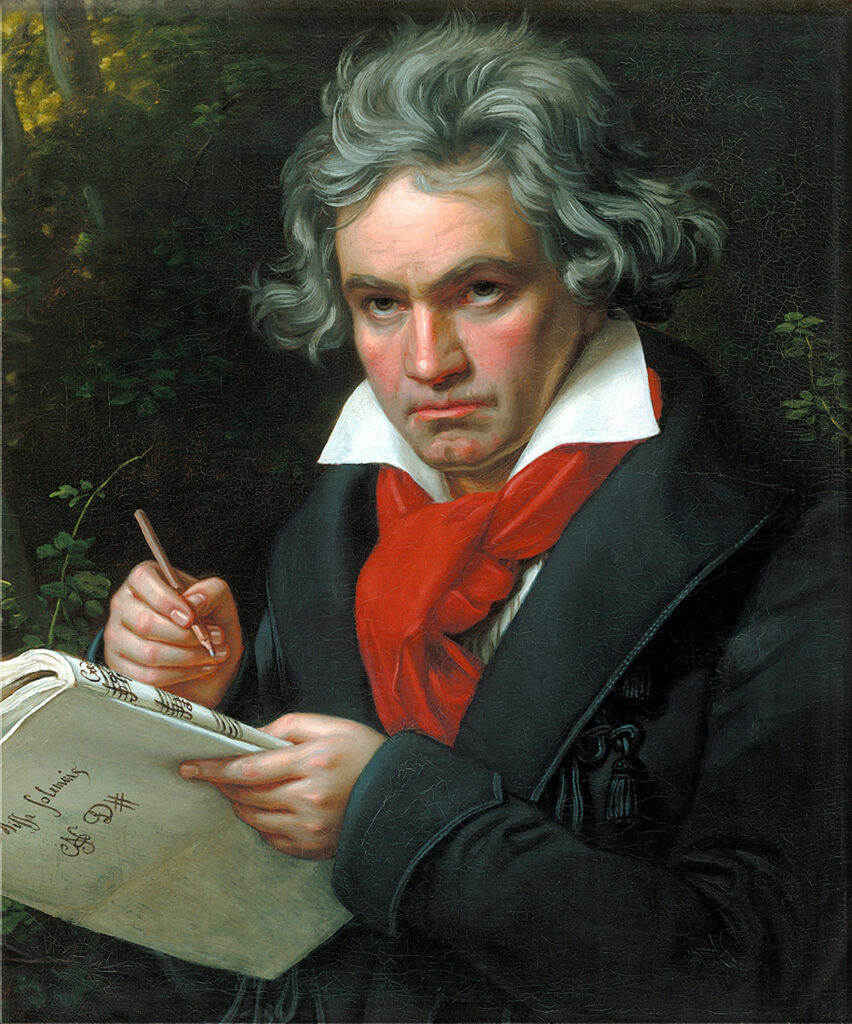Beethoven on Creative Vitality and Resilience in the Face of Suffering
INSPIRATIONAL, 17 Aug 2020
Maria Popova | Brain Pickings – TRANSCEND Media Service
“Day by day I am approaching the goal which I apprehend but cannot describe.”
“After all that has been said and mused upon the ‘natural ills,’ the anxiety, and wearing out experienced by the true artist,” Elizabeth Barrett Browning, who paved the way for women in the arts, wrote in reflecting on art and suffering from her sickbed, “is not the good immeasurably greater than the evil?” The great nineteenth-century poet is among the handful of highly influential artists who, like Frida Kahlo, surmounted an inordinate share of physical suffering to make art of unassailable beauty that heals the human spirit.
Among those few was Ludwig van Beethoven (December 16, 1770–March 26, 1827), whose abidingly transcendent music sprang from the common fountain of his joy and his suffering. By his late twenties, Beethoven had begun losing his hearing — a deterioration that would result in near-total deafness by the end of his life, the source of which remains a medical mystery and the object of ample speculative mythologizing. One contemporary biographer has proposed lead poisoning, while the composer himself allegedly implicated a fit of fury — a second-hand account reported to his first serious biographer held that when a tenor interrupted Beethoven’s creative flow during a period of vigorous composition, he flew into a rage so violent that he collapsed to the floor in a seizure, hitting his head, and was deaf by the time he rose.
By the end of his thirtieth year, Beethoven began actively seeking medical help for the ailment that anguished him and abraded his pride in his exceptional musical ear. Just as he was wading through the enigma of his suffering, in that strange and inopportune way the heart has of sneaking up on its owner, he fell in love with a young countess. A year before he wrote the spectacular letter to his brothers about the joy of suffering overcome, thirty-one-year-old Beethoven penned another letter of unrelenting optimism and towering spiritual resilience, found in the classic 1937 biography Beethoven: His Spiritual Development (public library).
Riding the tidal wave of elation that carries new love, Beethoven writes to his boyhood friend Franz Wegeler, then a medical student:
Oh, if I were rid of this affliction I could embrace the world! I feel that my youth is just beginning and have I not always been ill? My physical strength has for a short time past been steadily growing more than ever and also my mental powers. Day by day I am approaching the goal which I apprehend but cannot describe. It is only in this that your Beethoven can live. Tell me nothing of rest. I know none but sleep, and woe is me that I must give up more than to it than usual. Grant me but half freedom from my affliction and then — as a complete, ripe man I shall return to you and renew the old feelings of friendship. You must see me as happy as it is possible to be here below — not unhappy. No! I cannot endure it. I will take fate by the throat; it shall not wholly overcome me. Oh, it is so beautiful to live — to live a thousand times! I feel that I am not made for a quiet life.
He would go on to cultivate a lifestyle regimen that sustains this superhuman vitality, to embody the crucial difference between genius and talent, and to believe that music saved his life.
Complement this portion of Beethoven: His Spiritual Development with the great composer’s love letters to his “immortal beloved” and his touching letter of advice on being an artist, written to a little girl who sent him fan mail.
_______________________________________
 Brain Pickings is the brain child of Maria Popova, an interestingness hunter-gatherer and curious mind at large obsessed with combinatorial creativity who also writes for Wired UK and The Atlantic, among others, and is an MIT Futures of Entertainment Fellow. She has gotten occasional help from a handful of guest contributors. Email: brainpicker@brainpickings.org
Brain Pickings is the brain child of Maria Popova, an interestingness hunter-gatherer and curious mind at large obsessed with combinatorial creativity who also writes for Wired UK and The Atlantic, among others, and is an MIT Futures of Entertainment Fellow. She has gotten occasional help from a handful of guest contributors. Email: brainpicker@brainpickings.org
Go to Original – brainpickings.org
Tags: Inspirational, Ludwig van Beethoven
DISCLAIMER: The statements, views and opinions expressed in pieces republished here are solely those of the authors and do not necessarily represent those of TMS. In accordance with title 17 U.S.C. section 107, this material is distributed without profit to those who have expressed a prior interest in receiving the included information for research and educational purposes. TMS has no affiliation whatsoever with the originator of this article nor is TMS endorsed or sponsored by the originator. “GO TO ORIGINAL” links are provided as a convenience to our readers and allow for verification of authenticity. However, as originating pages are often updated by their originating host sites, the versions posted may not match the versions our readers view when clicking the “GO TO ORIGINAL” links. This site contains copyrighted material the use of which has not always been specifically authorized by the copyright owner. We are making such material available in our efforts to advance understanding of environmental, political, human rights, economic, democracy, scientific, and social justice issues, etc. We believe this constitutes a ‘fair use’ of any such copyrighted material as provided for in section 107 of the US Copyright Law. In accordance with Title 17 U.S.C. Section 107, the material on this site is distributed without profit to those who have expressed a prior interest in receiving the included information for research and educational purposes. For more information go to: http://www.law.cornell.edu/uscode/17/107.shtml. If you wish to use copyrighted material from this site for purposes of your own that go beyond ‘fair use’, you must obtain permission from the copyright owner.

